by Debbie Burke
One hundred years ago today, my father-in-law, Arthur Burke, was born.
I’ve been kicking around the idea of writing historical fiction. Arthur’s life contains a wealth of dramatic raw material on which a novel could be based. My imagination itches to step back in time and write about that era.
Grinding poverty defined Arthur’s childhood. His father, Daniel, was a violent Irish drunkard. Periodically, he would abscond with Arthur and his brother, then leave them in Catholic orphanages in various states. Their mother, Naomi, had to track down and recover her two young sons.
Naomi’s death in 1978 opened up a mystery. Among her papers, my husband and I found three different birth certificates in three different names with three different birth dates. The woman we’d known as “Naomi” had hidden lives.
Today, identities are indelibly recorded in databases. Not so in the late 1800s and early 1900s, when adopting a new name was common practice for people who wanted to leave problems behind. Reinventing one’s identity was as simple as providing a handwritten statement signed by a relative or friend. One of Naomi’s birth certificates was a sworn statement by an uncle, dated years after her supposed birth date.
On another certificate, her name was Ida Mae Dalton, listing her father as Frank Dalton, a deputy marshal related to the notorious Dalton Gang. In a sad reflection of that era, Ida Mae’s mother was not even given the respect of a name on that document but was identified only as “an Indian squaw or breed thereof.”
Who was Naomi really? Did she adopt aliases to hide from the abusive Daniel? Questions linger that can never be answered.
Naomi worked as a waitress to support the family. They were already poor enough that they hardly noticed the Great Depression. For heat, Arthur scavenged bits of coal that fell from train cars. He told about being so hungry, he ate grass.
In 1933, his life took a turn for the better when Naomi married Leonard Bloodsworth, a Navy chief who was the Pacific Fleet heavyweight boxing champion. Daniel no longer represented a threat since Len could knock the brutal father into next week.
But growing up in San Pedro, California during the Depression was still difficult.
Stepfather Len became Arthur’s best role model and champion. He would sneak the hungry boy onto his ship for chow. Thanks to Len, Arthur saw a doctor and dentist for the first time in his life.
The gangly, red-headed, freckle-faced Arthur had a brush with Hollywood when he appeared in the pilot film for a short comedy. He played a character named Alfalfa in the Little Rascals and was paid 50 cents, a fortune to a poor Bowery kid. What a different direction his life might have taken if another boy, Carl Switzer, hadn’t wound up playing the memorable, enduring role.
~~~
In high school, Arthur showed extraordinary inventiveness when he built a radar set for a science project. The FBI confiscated the set because the U.S. would soon be involved in World War II and wanted to keep advanced experimental technology a secret from enemy powers.
Despite Arthur’s genius, college seemed an unattainable dream because of poverty.
Then came a stroke of luck.
Appointments to prestigious military academies like West Point and Annapolis were granted by members of Congress, usually as political favors to wealthy constituents. However, one honest politician opened the opportunity to competitive exam, allowing any young man in his district to apply.
On a lark, Arthur accompanied a friend to take the exam for the Naval Academy. His friend was accepted and Arthur made the cut as an alternate. When his buddy had to withdraw, Arthur took his slot.
After a cross-country train trip, he reported for duty in Annapolis, Maryland with cardboard liners as soles for his worn-out shoes. His classmates, mostly sons of wealthy, influential families, looked down their patrician noses at the lanky, malnourished kid from the Bowery.
Nevertheless, his scientific brilliance earned him a place in the top 10% of his class.
The attack on Pearl Harbor on December 7, 1941 forced the U.S. into World War II and, only days afterward, led to early graduation for Arthur’s Class of 1942.
During that devastating attack, his stepfather Len was serving aboard the USS Tennessee. Eight battleships, including the Tennessee, were moored together in a group on Battleship Row in Pearl Harbor. Japanese bombs and torpedoes destroyed or disabled the most powerful ships in the U.S. fleet.
As injured shipmates were pulled from fires below decks, Len threw sailors over the side of the ship into the water to save them from the onboard inferno. When the nearby Arizona exploded, searing powder and shrapnel horribly burned Len’s back. He spent a year in a hospital before returning to duty to finish out the war.
The Pearl Harbor attack left the U.S. badly outnumbered and outgunned. A battered handful of surviving ships, including the aircraft carrier USS Enterprise CV-6, represented the only defense against the advancing Japanese fleet and probable invasion of the U.S. west coast.
Arthur served on the Enterprise which became the most decorated ship of World War II.
He described the feeling of being totally alone, desperate, and vulnerable in the vast Pacific Ocean while being hunted by the enemy. Before radar and other detection systems were commonplace, ships operated under strict blackout rules because the tiniest light could reveal the ship’s position to a patrolling submarine or plane.
One night while on watch, Arthur had a run-in with an admiral who decided to fire up his pipe on the flag bridge, a place of high visibility on the carrier. Arthur was a lowly lieutenant junior grade but he took his responsibility seriously. He told the admiral to put out the light because it was endangering the ship. The admiral refused. Arthur stood his ground and ordered the superior officer to his quarters. Fortunately the enemy didn’t spot the light.
The petty admiral never forgot and the episode dogged the rest of Arthur’s naval career, despite his stellar scientific achievements.
Arthur survived the pivotal battles of Midway and Coral Sea. During one attack, a bomb exploded in his quarters. Because he had traded duty stations with another officer, he was not in his bunk at that time and escaped death.
But, in the confusion, he was mistakenly listed as killed in action and his footlocker was shipped home. Naomi, who supported the war effort as an air raid warden, endured many grief-stricken months before she learned her son was still alive.
Arthur rose quickly through the ranks because of his scientific ability. He developed instrumental new uses for radar that played a major role in Allied victory.
Later, he returned to Annapolis to teach—not a bad achievement for a hungry kid who arrived on the Naval Academy campus with cardboard soles in his shoes.
Will Arthur’s experiences become my first historical novel? Time will tell.
Meanwhile, Happy 100th Birthday, Pop!
~~~
TKZers: What books based on real-life experiences had a big impact on you?
Have family stories inspired your own writing?

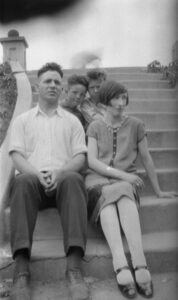
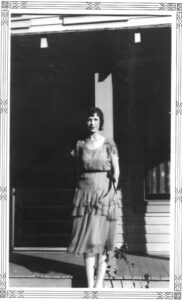
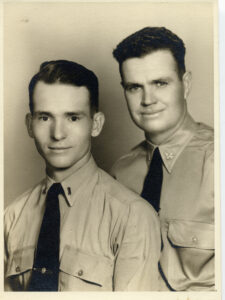
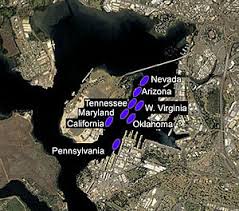
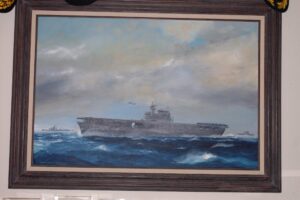
What a story~!
My mother had an uncle who may have known (and possibly duked it out), with your father-in-law’s step dad – he was in a different weight class, but went 110-3 boxing in the Pacific Fleet. He, too, was at Pearl Harbor, stationed ashore, but spent three days down on the base, sending hungry sailors to his house for something to eat in exchange for saying they’d seen Joe and that he was alright… (Small world, huh?)
As to your question, though…
I mixed local history with family history for a NaNo a few years ago, writing (attempting?) an interwoven story of three brothers who fought for the Confederacy, in each of the three major theaters – the Army of Northern Virginia, the Army of the Tennessee, and the Navy.
While sounding like a John Jakes novel, this is the story of my great-great grandfather and his two brothers from Montgomery.
Each came home in one of the three ways one returns – my GGF (for whom I am named and got the “III” in my signature), lost an arm at Gettysburg and was imprisoned at Fort Delaware, before being released and left to find his own way back to Alabama. One brother fought Sherman from Tennessee through North Georgia and died here in Atlanta at the Battle Peachtree Creek. The other started in the artillery, but was mustered out due to dysentery, winding up in Mobile serving in the Commissary Corps with the blockade runners, before eventually making it home… (The local history part is another posting…)
And having read since I was a kid, I can probably count on one, maybe both, hands the number of books that HAVEN’T had an impact of some sort… except I can’t remember ’em…
In any event, I hope your “homage” to your father-in-law comes together…
Wow, George, your mom’s uncle and Len surely knew each other. Len was a mustanger who had to give up boxing when he became an officer. Wish we could travel back in time and sit down with them.
Your Nano novel sounds fascinating. Are you still working on it? I’d love to read it.
Correction: my husband said when Len was fleet champ, he was a second class petty officer, not yet a chief.
Mom’s uncle mustered out as a Master Chief Bosun’s Mate after 25 years (of which 2 or 3 were “underage” – it being the depression and all, and his mom signed the papers, when he enlisted).
Yes, it’s in an edit stage, and therefore a WIP~ scrawled in 30 days, it needs a lot of the W… ?
Sounds like it’s worth the W.
That was an amazing story! I hope you do write it, and turn it into a series, and a blockbuster movie and a television series!
Thanks, Joe. From your lips to Ken Burns’s ears!
Fascinating!
Thanks, Terry.
I would read this in a heartbeat! Please do write about your father’s amazing history!
Out parents’ and grandparents’ generations saw SO much. My uncles were all on the beaches at Normandy. My father fought & was direly wounded in Korea. All the men on that side of the family were scrappy daredevils who survived their various wars to come home & race cars & motorcycles and get into barfights & shootouts.
My father-in-law did super secret radar work in Vietnam.
If only I had the time to tell their stories!!
Cyn, they were dubbed the “Greatest Generation” with good reason.
Yes, time is the biggest problem for me, too. I hope to write Pop’s story before *I* reach 100!
Great post, Debbie! I will await your historical fiction novel with anticipation. I’d read this story in a heartbeat-it has all the elements I love: family drama, secrets, war stories, and most of all, the heroes whose loyalty and bravery form the bedrock of these United States of America. I love our vets! And I gravitate toward stories of the underdog on his last legs, but then takes a leap of faith and lands on his feet. (I’m pretty sure that last sentence needs a good editor, but you get my drift.) Anyway, I thought it sounded a bit like your Pop.
I’ve read and re-read two books: The Hiding Place by Corrie ten Boom, and Christy by Catherine Marshall. World War II stories have a special place in my heart. And Marshall’s descriptive narrative makes my heart sing. I’d like to see the setting of Cutter Gap someday.
Keep us in the loop on this book, okay? 🙂
Thanks for your encouragement, Deb! I have to drag out two boxes of Naomi’s mementos in the basement and get to work.
One of my mother-in-law’s husbands was also at Pearl Harbor. During the attack, the battleship Oklahoma took many hits and turned turtle, trapping sailors inside. http://www.ussoklahoma.com/ He supervised the crew that cut through the hull and saved some.
In the 1980s, we were watching the old Victory at Sea TV series with him.The series included actual footage from WWII. One episode showed the upside-down ship with men working feverishly to cut through the hull. He pointed at one of the figures in the scene and said, “That’s me.”
Talk about chills.
Wonderful post, Debbie. We need to preserve these stories! I am so glad that I was able to digitize and re-publish my father’s WWII naval memoir, which he self-published back in the day when that cost money! I wrote about the book on TKZ.
Jim, after you wrote that post, I read Peter Charlie. Wonderful stories. Our relatives truly lived The Hero’s Journey.
A story so astonishing reviewers would say it can’t be real, but it is.
I’ve done geneological research for my siblings’ kids. I’m a dead twig on the family tree since I never had kids. One book on my dad’s side told how we “fought” for the Confederacy. I didn’t know there were so many nice words to replace “desertion.” Snort. No one died in the war, but my grandfather nearly starved during Reconstruction which made the Great Depression look like a world of plenty.
My brother took the 23 & Me test which proved fascinating. Both sides of my family were Methodists who came to the US to escape religious persecution before the Revolution. Everyone married within the church, but instead of being totally German as we were told, we are more English and French than German. Plus, we can roll our tongues, can’t smell asparagus pee, and hate licorice. Who knew?
Genealogy is a bottomless treasure chest, Marilynn. How cool for your nieces and nephews.
Can’t smell asparagus pee? Never heard that one before!
I share a birthday with your father, although I’m several decades younger. For the past 20 minutes, I’ve been searching for my relatives in Mt Pleasant Cemetery in Toronto (160,000 people are buried there). I visited their graves two years ago when I was there for Bcon, and I have pictures, but darned if I can find their actual gravemarker numbers online. Researching history can be frustrating. It’s part of a sub-plot in my current WIP, and at the time I visited the cemetery the first time, the office was closed and I had little help looking for the markers. I was there by myself in the midst of a damaging windstorm with dusk nearing, and one of those moments you know you have to write in a future story. Happy birthday to your father!
Happy birthday, Alec!
Have you tried Find a Grave? They have American cemetery records but I don’t know if they include Canadian ones.
Historic research is frustration 90% of the time but when you stumble onto that gold nugget, it’s so worth it
A windstorm in a dark cemetery sounds like a truly compelling scene.
Fascinating story, Debbie! You should definitely write it.
An astonishing (and painful) family truth punched me in the face a few months ago; a truth that shook the very foundation on which I stood. Something inside me screams for me to write this story, so I’m toying with the idea. It’ll be a difficult project, though. I’m hoping it’ll also be cathartic.
Sue, family shocks can shake one’s own sense of identity. Writing the story may help your peace of mind. In the end, no matter what relatives did in the past, you are still who you are.
There were some gritty skeletons in Pop’s closet that I didn’t include in this post but will in the novel.
Holy smokes! What a great tale. You couldn’t have made that one up, it is so rich. It reminds me, again, of the question of why some children are so resilient and others are not.
My only family lore that is remotely cool is that one great-grandfather was married five times and outlived all his wives. He is buried in Virginia with each wive positioned like star points around him. True story…I had my family tree researched by the Mormons once for a newspaper story I did back when geneology was getting hot.
The LDS have all of us in their huge geneology data banks. They used to trace anyone’s tree (for a fee) but stopped years ago. I still have the elaborate book they put together for me with all the records they found.
Gramps must have been quite a guy, Kris. The image of those graves would make a cool book cover.
A good friend is a genealogist at the local LDS library. She helped me do a family history for my adopted mother, who was black, going back to slavery times. We also visited the huge Mormon library in Salt Lake City. You could get totally lost in time.
what an amazing story, Debbie. Thanks for sharing, and I hope you write that book.
My father was also raised in poverty in the early part of the 20th century in rural Georgia. He never talked about his upbringing, and never complained about anything. I regret so much not having asked, now that he and his generation are gone, I’ve thought about researching that period for a historical novel as a memorial to my father.
What an incredible generation that was.
The Mormon database is a goldmine of family history, and it’s free to use. I did some searching in it recently and discovered a lot of fascinating information.
Thanks, Kay. Like your father, my father-in-law never complained. He was appreciative of the smallest things. If I cooked him scrambled eggs, he’d say, “This tastes so wonderful, I wish I could give you a bag of gold.”
I love that. I think people who have suffered deprivation in their lives often appreciate things so much more than most of us. And it makes the rest of us love them even more.
thanks again
What a fascinating story! I would read that in a heartbeat.
We’re a pretty sedate family; no family secrets or scandals that I know of. However, my paternal grandfather was a full-blooded Cajun. He got the strap for speaking French, so never taught his children to speak French, which was a damn shame. I went back to the US last year for a visit and was speaking with my uncle (granddad’s brother) and had a hard time keeping myself from bursting into tears. The voice, the accent, the little terms of endearments (sha, tiger, podna) still stay with me.
Happy to say that he’s inspired at least one character, possibly a few more.
Thanks, Mollie. Sounds like your grandfather lives on in his brother. Glad you could spend time with him.
Yes, real people inspire wonderful characters.
I hope you were able to see the movie “Midway.” Much of the action takes place on board the Enterprise, your father-in-law’s ship. If the viewer pays close attention, we can spot several seemingly-minor events that helped turn the tide of the war. All three of our aircraft carriers (and we only had those three, amazingly enough; the Japanese had ten) were at sea on 12/7/41. If even one had been in port, the enemy surely would’ve thrown everything they had at it and the loss of that one carrier could’ve meant defeat in the Pacific for us. The Japanese didn’t bomb the oil tanks at the port; had they done so, the fleet would’ve had to retreat to the West Coast, leaving the entire Pacific to the enemy. Hawaii would’ve been virtually defenseless. If the Japanese take Hawaii, it’s all over. What if Doolittle’s raid on Tokyo had failed? The Japanese were stunned by the attack, something that had never happened to them in their long history, and thus became more cautious in their strategy. And then there were the enemy’s tactics at Midway, which came about because Nimitz pretty much ignored Washington’s orders and sent in the carrier battle groups, truly rolling the dice.
The heroism of those sailors and pilots is on full display in the film. It’s a wonder any of them survived.
David, I haven’t seen the new Midway but saw the 1976 version with Charleton Heston, Henry Fonda, Robert Mitchum: https://www.military.com/off-duty/2019/10/30/7-weird-facts-about-1976-movie-midway.html
As you say, the smallest details led to major consequences that turned the entire tide of the war. Those service members define the word heroism.
Remarkable story and life! You should definitely write that historical novel.
Thanks, Ann. I better get to work!
Thank you for sharing that amazing story with us. It’s and inspiration to not give up because the going might get a little tough. I agree with the others, it will make an excellent book.
Thanks, Cecilia. Persistence in the face of overwhelming obstacles was the hallmark of the Greatest Generation.